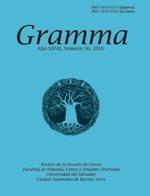To Migrate: The «Freedom of the Poor». The Sardinian Writter Mariangela Sedda
Keywords:
Migration, Italian Literature, Argentina, Sardinia, Mariangela Sedda, Contemporary Literature, MemoryAbstract
The present article aims to provide evidence as well as reflections on Italian migrant literature written from the Nineties of the twentieth century. Besides presenting a corpus which can be considered representative of national literature, this article focuses on narratives produced in Sardinia and, more in particular, on the ones dealing with Sardinian migration to Argentina. The data collected on migration flows from the island and on its main features, as well as an outline of Sardinian migrant literature provided in the article build a solid background to adequately locate Oltremare (2004) and Vincendo l’ombra (2009) by Mariangela Sedda, native of Gavoi, a village in Central Sardinia. The two literally weave together uncommon instances of migrant narrative, since their representational axis is at the same time the one of characters who leave and that of those who stay. Sedda’s novels thus render the mirror -like quality of the drama of migration, where the disarticulation of identity concerns both migrants and their families. The epistolary structureof the novels —presenting the dialogue between two sisters, which, in turn, functions as compensation and mediation of absence— illuminates the ambivalence of the perception of migration, as well as the diverse ways in which it affects the community of origin and that of arrival. The two works constitute a remarkable case study within the context of Italian migrant literature, since they question the homogenization of representations by embracinga decentred, insular perspective.Downloads
Published
How to Cite
Issue
Section
License
Works published in this journal are licensed under a Creative Commons Attribution-NonCommercial-
Works published under this licence may be shared, copied and redistributed in any medium or format. Adaptation, remixing, transformation and creation are also authorised. Both sharing and adapting are permitted as long as credit is given to the work appropriately, providing a link to the licence and indicating whether changes have been made. Commercial use of the material is also not possible.








